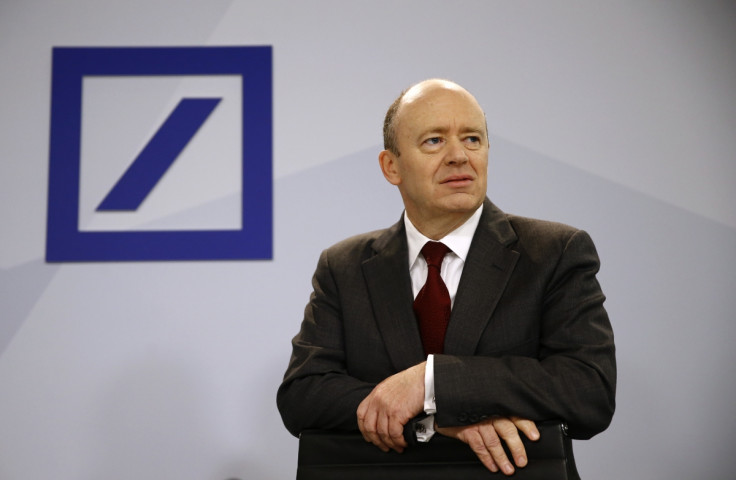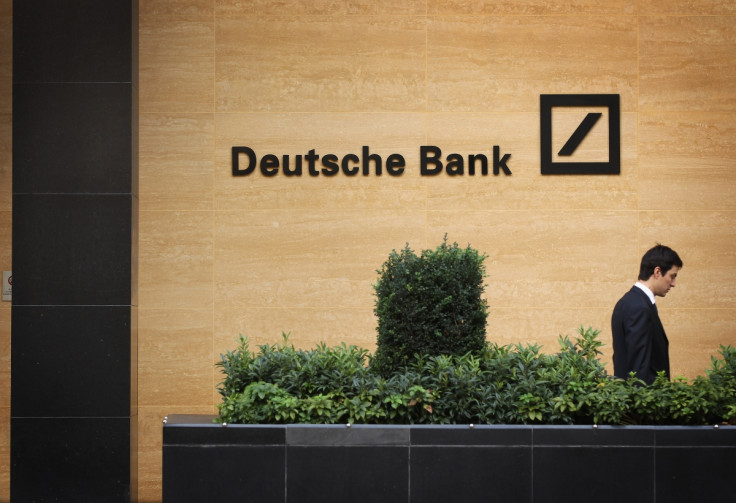Deutsche Bank shares hit 30-year low as market prepares for Berlin bailout
Strongman of European banking brought to its knees by a $14bn penalty from the US Department of Justice.

This week the once mighty Deutsche Bank has seen its share price touch 30-year lows, spooking the European banking sector in the process. Berlin is said to be drawing up a rescue plan, while the bank's Yorkshire-born boss has come out fighting.
Why is the German government preparing a rescue plan for one of Europe's biggest banks, Deutsche Bank?
Berlin and its financial watchdog Bafin are preparing to bailout Deutsche Bank in case it fails to pay for costly US litigation the lender faces, German weekly Die Zeit reported today (28 September).
Regulatory hurdles would be smoothed to allow Deutsche Bank to sell assets that would ease the strain on the lender, according to the plan.
In an extreme emergency, the German government would even offer to take a direct 25% stake in the bank, the paper added without citing sources.
However, a German finance ministry spokesman denied it was preparing a rescue plan for the bank. Deutsche Bank declined to comment.
Why does Deutsche Bank need to raise cash?
The US Department of Justice (DoJ) earlier this month proposed that Deutsche Bank pay a $14bn (£10.8bn) penalty to settle allegations of mis-selling mortgage securities in the run up to the financial crisis in 2008.
This is a problem for the bank because it thought its DoJ fine would be closer to $2.5bn.
German news magazine Focus claimed over the weekend that Chancellor Angela Merkel had ruled out a government rescue for Deutsche during a confidential meeting with the bank's Harrogate-born chief executive John Cryan, who was brought in 15 months ago to turn the bank around.
But yesterday Cryan told German newspaper Bild: "At no point did I ask the chancellor for support. Neither did I suggest anything like that." He added that the bank did not need state support.
But this has done nothing to calm Deutsche Bank shareholders, who have seen the stock slump by 60% this year as the lender faces a number of fines and litigation costs. This week the stock touched 30-year lows.
How have other banks across Europe reacted?
Shares in a range of lenders across the continent, from UniCredit in Italy to BNP Paribas in France, have fallen over the last few days. Investors have been reminded how fragile the banking sector is, particularly in this prolonged low-interest environment where it is difficult to make money on loans.
Royal Bank of Scotland stock has fallen as much as 9% since last Friday, as it awaits a settlement with the DoJ on its sale of mortgage-backed securities in the run up to the financial crisis later in the year.

Can Deutsche Bank find the cash it needs?
On the face of it things look bad. The DoJ has asked for $14bn, and the bank's market valuation only amounts to €15bn. However, the lender's assets are valued at €1.8trn, and analysts say the bank can lay its hands on €250bn of readily sellable assets.
It sold its Abbey Life assurance business to UK insurer Phoenix Group for €1.09bn today (28 September), providing a small uptick to the bank's shares.
But the worry for investors is that the bad news keeps on coming from Germany's largest bank.
Despite asset sales, plans to axe 9,000 staff and a two-year suspension of its dividend the bank still posted a €6.8bn loss last year. The bank, in common with other lenders, also faces a range of regulatory fines and civil suits.
Deutsche Bank is arguably too big to fail and markets could well look to test the German government's resolve on that as we head into next year.
How did one of Europe's largest banks end up in this position?
Few companies are more closely associated with Germany's post-war economic miracle than Deutsche Bank. Long before the European Central Bank existed, it worked hand in glove with the country's central bank, the Bundesbank, to provide rock solid non-inflationary growth for decades.
The bank expanded its global ambitions in the 1990s when it took on the big US investment banks like JP Morgan and Goldman Sachs to fight for the biggest IPOs and capital raisings around the world.
But it suffered during the financial crisis, and has struggled to fully recover ever since. It makes more than 80% of its revenues from its investment bank, and does not have big retail banking and credit card businesses it can rely on to generate steadier earnings.
Will the German government be forced to bailout Deutsche Bank?
Berlin has denied the move. And this would be an unpopular measure for Angel Merkel ahead of Germany's elections later this year. If her government were to help out the bank, it would almost certainly breach European Union rules on state aid.
But if faced with no other option analysts expect Germany to intervene.
The Italian government is currently exploring ways to help its ailing banking sector and it is thought that if Italy is allowed to bend the rules, Germany will be too.
CMC chief market analyst Michael Hewson said: "Deutsche Bank is arguably too big to fail and markets could well look to test the German government's resolve on that as we head into next year."
He added: "We already know from 2008 here in the UK how quickly sentiment about the health of an important financial institution can shift and the willingness of politicians to react to shore up market concerns about a 'systemically important' financial institution."
© Copyright IBTimes 2025. All rights reserved.






















